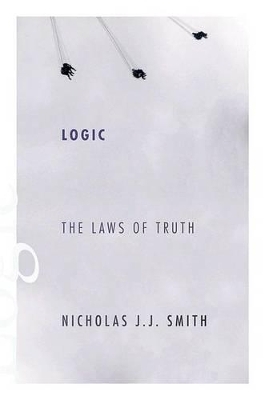
Logic
Princeton University Press (Verlag)
978-0-691-15163-2 (ISBN)
Logic is essential to correct reasoning and also has important theoretical applications in philosophy, computer science, linguistics, and mathematics. This book provides an exceptionally clear introduction to classical logic, with a unique approach that emphasizes both the hows and whys of logic. Here Nicholas Smith thoroughly covers the formal tools and techniques of logic while also imparting a deeper understanding of their underlying rationales and broader philosophical significance. In addition, this is the only introduction to logic available today that presents all the major forms of proof--trees, natural deduction in all its major variants, axiomatic proofs, and sequent calculus. The book also features numerous exercises, with solutions available on an accompanying website. Logic is the ideal textbook for undergraduates and graduate students seeking a comprehensive and accessible introduction to the subject.
* Provides an essential introduction to classical logic * Emphasizes the how and why of logic * Covers both formal and philosophical issues * Presents all the major forms of proof--from trees to sequent calculus * Features numerous exercises, with solutions available at http://www-personal.usyd.edu.au/~njjsmith/lawsoftruth * The ideal textbook for undergraduates and graduate students
Nicholas J. J. Smith is senior lecturer in philosophy at the University of Sydney in Australia. He is the author of Vagueness and Degrees of Truth.
Preface xi Acknowledgments xv Part I Propositional Logic 1 Chapter 1: Propositions and Arguments 3 1.1 What Is Logic? 3 1.2 Propositions 5 1.3 Arguments 11 1.4 Logical Consequence 14 1.5 Soundness 21 1.6 Connectives 23 Chapter 2: The Language of Propositional Logic 32 2.1 Motivation 32 2.2 Basic Propositions of PL 32 2.3 Connectives of PL 36 2.4 Wff Variables 39 2.5 Syntax of PL 40 Chapter 3: Semantics of Propositional Logic 49 3.1 Truth Tables for the Connectives 49 3.2 Truth Values of Complex Propositions 51 3.3 Truth Tables for Complex Propositions 54 3.4 Truth Tables for Multiple Propositions 58 3.5 Connectives and Truth Functions 59 Chapter 4: Uses of Truth Tables 63 4.1 Arguments 63 4.2 Single Propositions 67 4.3 Two Propositions 69 4.4 Sets of Propositions 74 4.5 More on Validity 75 Chapter 5: Logical Form 79 5.1 Abstracting from Content: From Propositions to Forms 81 5.2 Instances: From Forms to Propositions 82 5.3 Argument Forms 84 5.4 Validity and Form 87 5.5 Invalidity and Form 91 5.6 Notable Argument Forms 94 5.7 Other Logical Properties 95 Chapter 6: Connectives: Translation and Adequacy 97 6.1 Assertibility and Implicature 97 6.2 Conjunction 103 6.3 Conditional and Biconditional 110 6.4 Disjunction 117 6.5 Negation 122 6.6 Functional Completeness 124 7 Trees for Propositional Logic 134 7.1 Tree Rules 136 7.2 Applying the Rules 140 7.3 Uses of Trees 146 7.4 Abbreviations 156 Part II Predicate Logic 161 Chapter 8: The Language of Monadic Predicate Logic 163 8.1 The Limitations of Propositional Logic 164 8.2 MPL, Part I: Names and Predicates 167 8.3 MPL, Part II: Variables and Quantifiers 172 8.4 Syntax of MPL 182 Chapter 9: Semantics of Monadic Predicate Logic 189 9.1 Models; Truth and Falsity of Uncomplicated Propositions 191 9.2 Connectives 196 9.3 Quantified Propositions: The General Case 197 9.4 Semantics of MPL: Summary 204 9.5 Analyses and Methods 206 Chapter 10: Trees for Monadic Predicate Logic 211 10.1 Tree Rules 212 10.2 Using Trees 223 10.3 Infinite Trees 228 Chapter 11: Models, Propositions, and Ways the World Could Be 242 11.1 Translation 243 11.2 Valuation 247 11.3 Axiomatization 251 11.4 Propositions 253 11.5 Logical Consequence and NTP 257 11.6 Postulates 261 Chapter 12: General Predicate Logic 264 12.1 The Language of General Predicate Logic 264 12.2 Semantics of GPL 276 12.3 Trees for General Predicate Logic 282 12.4 Postulates 286 12.5 Moving Quantifiers 293 Chapter 13: Identity 298 13.1 The Identity Relation 299 13.2 The Identity Predicate 303 13.3 Semantics of Identity 306 13.4 Trees for General Predicate Logic with Identity 311 13.5 Numerical Quantifiers 321 13.6 Definite Descriptions 326 13.7 Function Symbols 343 Part III Foundations and Variations 355 14 Metatheory 357 14.1 Soundness and Completeness 358 14.2 Decidability and Undecidability 368 14.3 Other Logical Properties 374 14.4 Expressive Power 382 15 Other Methods of Proof 385 15.1 Axiomatic Systems 386 15.2 Natural Deduction 407 15.3 Sequent Calculus 421 16 Set Theory 438 16.1 Sets 438 16.2 Ordered Pairs and Ordered n-tuples 449 16.3 Relations 453 16.4 Functions 454 16.5 Sequences 458 16.6 Multisets 460 16.7 Syntax 462 Notes 467 References 509 Index 515
| Erscheint lt. Verlag | 1.4.2012 |
|---|---|
| Zusatzinfo | 80 line illus. 90 tables. |
| Verlagsort | New Jersey |
| Sprache | englisch |
| Maße | 152 x 235 mm |
| Gewicht | 879 g |
| Themenwelt | Geisteswissenschaften ► Philosophie ► Logik |
| ISBN-10 | 0-691-15163-6 / 0691151636 |
| ISBN-13 | 978-0-691-15163-2 / 9780691151632 |
| Zustand | Neuware |
| Haben Sie eine Frage zum Produkt? |
aus dem Bereich


